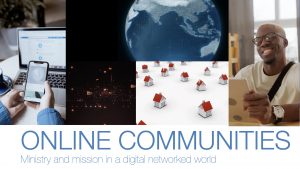 Here are some resources from sessions 2 and 3 of Creating Authentic Christian Communities Online, hosted by me in July and September 2024 for the Centre for Music, Liturgy and the Arts. The sessions were an opportunity to explore online worship in relation to the broader context of living in a digitally networked society and being a digitally networked church. An outline of the first session is here. We had people from 10 churches joining us across the three sessions. Half of each 90 minute session was led by me, while the other half featured the online worship story and tech journey of the host churches – Adelaide West, Burnside City and Westbourne Park Uniting Churches. The following resources are a combination of the second and third sessions.
Here are some resources from sessions 2 and 3 of Creating Authentic Christian Communities Online, hosted by me in July and September 2024 for the Centre for Music, Liturgy and the Arts. The sessions were an opportunity to explore online worship in relation to the broader context of living in a digitally networked society and being a digitally networked church. An outline of the first session is here. We had people from 10 churches joining us across the three sessions. Half of each 90 minute session was led by me, while the other half featured the online worship story and tech journey of the host churches – Adelaide West, Burnside City and Westbourne Park Uniting Churches. The following resources are a combination of the second and third sessions.
Constructed Identities
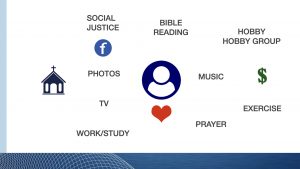 We reviewed the notion that all of us construct our identities from multiple sources – groups, relationships, media, etc. It would be wrong to assume that this is something that only young people or “seekers/drifters” do. People who are active in the church access many faith and spiritual resources from across the globe, many from beyond their official denomination resources. And we do this in the context of the various activities that make up our lives – work or study, home and family, hobbies, social issues, leisure, spiritual disciplines, finances, etc. Church attendance is only one small part of this. This is not simply some random bricolage, but part of our ongoing personal journey of constructing and reconstructing our storied identities. Perhaps in the digital era this is more fluid, nevertheless from a religious perspective, it is helpful to acknowledge that we are story-formed people, and that media are critical in this process.
We reviewed the notion that all of us construct our identities from multiple sources – groups, relationships, media, etc. It would be wrong to assume that this is something that only young people or “seekers/drifters” do. People who are active in the church access many faith and spiritual resources from across the globe, many from beyond their official denomination resources. And we do this in the context of the various activities that make up our lives – work or study, home and family, hobbies, social issues, leisure, spiritual disciplines, finances, etc. Church attendance is only one small part of this. This is not simply some random bricolage, but part of our ongoing personal journey of constructing and reconstructing our storied identities. Perhaps in the digital era this is more fluid, nevertheless from a religious perspective, it is helpful to acknowledge that we are story-formed people, and that media are critical in this process.
Digital Religion Research
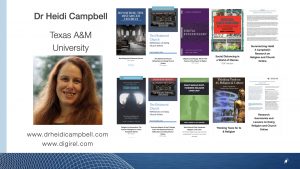 We explored some themes in the research of Dr Heidi Campbell from Texas A&M University in the US. Heidi is one of the most prominent researchers in the world in the fields of media, religion and culture, in particular with digital technologies. Heidi has a wide range of excellent resouces available for free on her website – see e-resources. We discussed some of the findings presented in the White Paper “Research and Lessons on Doing Religion and Church Online” including
We explored some themes in the research of Dr Heidi Campbell from Texas A&M University in the US. Heidi is one of the most prominent researchers in the world in the fields of media, religion and culture, in particular with digital technologies. Heidi has a wide range of excellent resouces available for free on her website – see e-resources. We discussed some of the findings presented in the White Paper “Research and Lessons on Doing Religion and Church Online” including
- Online expressions of church should be connected to and mirror offline expressions of church
- There needs to be consistency between digital and offline presentations and articulations of church identity
- Digital media can be used by people to articulate and work out their religious identities and visions
- The Internet can connect online and offline religious activities and experiences
- An online religious presence and involvement can solidify members’ investment in their offline faith community
- The Internet provides a space and opportunity for people to work out and act out their religious identity online
- Religious people seek connection and coherence between their online and offline religious practices
A second research summary by Dr Campbell is available here.
Audiences, Participants, Learners
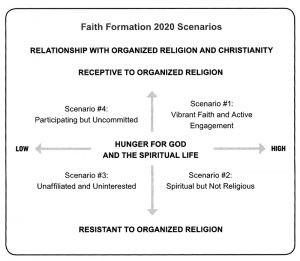 John Roberto’s book Faith Formation 2020 describes four scenarios for faith formation, which I use to explore who are our assumed audience, participants or learners. The book is available as a free download here along with other excellent books. One of Roberto’s contentions is that we too easily aim our faith formation activities at the most interested and connected people.
John Roberto’s book Faith Formation 2020 describes four scenarios for faith formation, which I use to explore who are our assumed audience, participants or learners. The book is available as a free download here along with other excellent books. One of Roberto’s contentions is that we too easily aim our faith formation activities at the most interested and connected people.
CLICK IMAGES TO ENLARGE.
- How do our assumptions about who is present in worship, face to face and online, shape how we worship and how we communicate?
- What faith formation strategies do we offer for each of these groups of people?
- Which strategies have either a digital or hybrid approach?
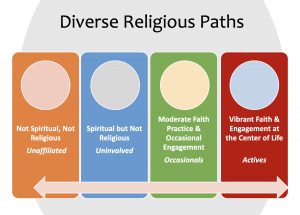 Roberto offers an alternative representation of the above – this resonates directly with the research done by the National Church Life Survey in the wider Australian community. [See 2018 survey report here.]
Roberto offers an alternative representation of the above – this resonates directly with the research done by the National Church Life Survey in the wider Australian community. [See 2018 survey report here.]
A Faith Formation Ecosystem
Roberto speaks of envisaging a 24/7 faith formation eco-system which includes church home and wider community. I interviewed him about this in Sydney at the Reimagining Faith Formation Conference.
Hybrid Faith Formation
Here’s another brief interview with John Roberto about why we need to explore digital faith formation.
The final part of the session involved some “what ifs?” around providing WWW or email-based accompaniments to seasonal worship (eg. Advent / Lent) for 24/7 faith development. eg. daily reflections.
